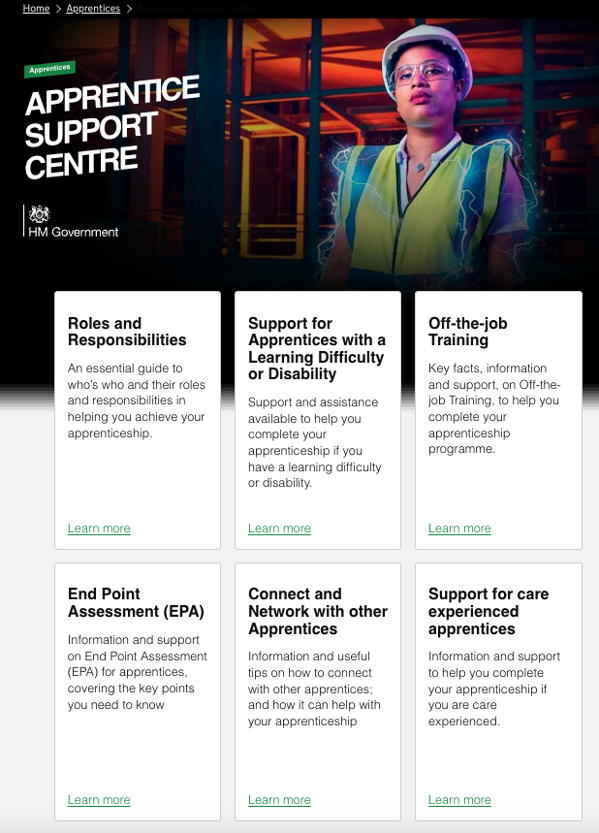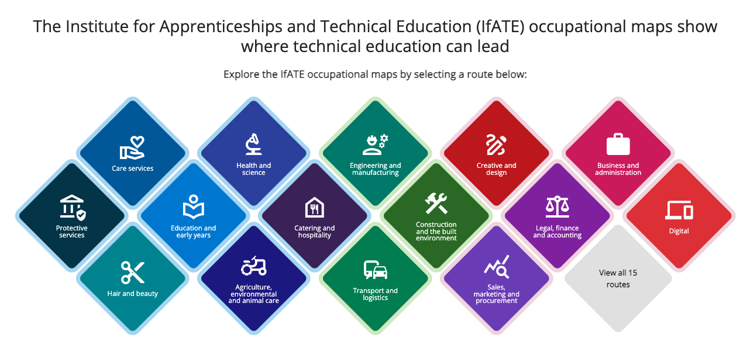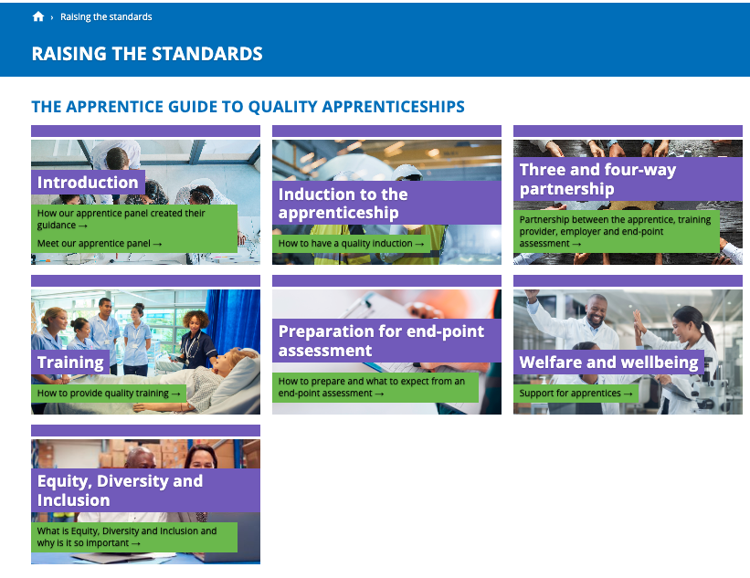The Apprentice Panel is an advisory group made up of current apprentices who work with the Institute for Apprenticeships and Technical Education (IfATE). They come from various sectors, levels, ages, and regions across England. In February 2022, the panel created a survey and invited all apprentices to share their views so we could learn about various aspects of the apprenticeship experience. The findings of the 2022 apprentice panel survey are available on our website.
The survey was done online through a range of channels including social media, email lists, and events. In total 2,016 apprentices responded. Whilst this represents 0.33% of the total number of apprentices in 2021/22, and is not a representative sample of all apprentices, it was felt that the number was sufficient to make the results meaningful. There was an increase compared to 1,052 responses received to the 2020 survey.
After the survey, the Apprentice Panel formed a working group aiming to lead and create change based on the six recommendations below.
We worked closely with IfATE, the Department for Education (DfE) and other professional bodies to act on the six recommendations and a working group met every six weeks to track impact. The focus has been offering our insights and perspectives. We have done this through consultations, monitoring progress, and deliberating on the most effective methods to maximise our impact and influence.
It has been a privilege to lead this piece of work and to have had the opportunity to shape the future of apprenticeships. The Apprentice Panel is pleased to present to you the impact of the work we have done and outline the changes which have taken place as a result over the last twelve months.

Arjun Rai,
Chair 2022 Survey Working Group
|
Recommendation |
Action Taken |
|
Improve access to information about apprentice networks and other sources of support for prospective and current apprentices. |
• Consultation work with DfE |
|
Require employers to be more transparent about the balance of online and face-to-face training and support they offer to their apprentices. |
• Employer Quality Roadmap guidance |
|
Advocate for a limit to travel costs incurred by apprentices required to attend face-to-face training at locations remote from their place of work. |
• Signposts to funding support for apprentices |
|
Do more to support employers in assuring apprentice wellbeing, including wellbeing in homeworking settings. |
• Guidance for employers on Employer Quality Roadmap |
|
Strengthen apprentice, employer, and training provider engagement with the commitment statement, making it a more meaningful guarantee and reference point for apprenticeship quality. |
• Improved training plan |
|
Undertake further research into the differences between the experiences of SME apprentices and apprentices who work for larger corporations. |
• Consultations carried out with apprentices, employers, and training providers. |
The results of the survey revealed that it can be difficult for apprentices and prospective apprentices to locate information related to apprenticeships, apprentice networks and support materials.
In response to this the Apprentice Panel worked closely with colleagues in DfE. The panel explained it can be difficult it can be to find the information required to understand and apply for apprenticeships. We provided ideas about making the existing information more accessible and easier to find. We were able to support in the development of a central hub which would bring together all the information and resources. The DfE recognises the valuable contribution that the Apprentice Panel made to the creation of the Apprentice Support Centre which launched earlier in 2023. and in particular, the support they provided to help create the resources.

When they access the support centre, apprentices can now find information which tells them about the roles and responsibilities of all parties, information about the ‘off-the-job’ entitlement, and end point assessment (EPA). There is guidance about how to raise concerns about a training provider and how the employer can help and there are links to apprentice networks.
It is worth noting that the DfE is continuing to review the usage of this site by apprentices and has plans to develop the website further. As a panel we will continue to push for clearer guidance on what to do when an apprentice has problems related to an employer.
The Apprentice Panel also worked closely with members of IfATE. We looked at bringing together information on apprenticeships from level 2 to level 7, across the 15 different routes. We were consulted on work already being done on the Occupational Maps. Before it went live, panel members took part in testing the functionality and accessibility. We provided feedback on areas we felt IfATE could improve.

The Occupational Maps provide clear and easily accessible guidance for prospective apprentices. The information is centred round occupations. They group together the information that an apprentice requires to make informed choices, in one place. The maps show the different levels of apprenticeship available and progression between levels. Clicking on an apprenticeship provides links to the occupational standard and it also lists the employers involved in creating the standard. Panel members supported IfATE at the Annual Apprenticeship Conference in Birmingham, helping to demonstrate how the occupational maps work to attendees.
In the survey, apprentices told to us that they wanted employers to be more transparent about the training and support they offer to apprentices. They wanted to be better informed when choosing which apprenticeship to do and especially wanted more information about the type of training offered. On 6th February 2023, the DfE addressed this when they launched the Employer Quality Roadmap. (EQR). This is a new step by step guide for employers of all sizes. The guide clarifies the steps involved in delivering successful apprenticeships. The guide is user-friendly and sets out the responsibilities of the employer. It explains how to support an apprentice and plan for their progression once they complete the apprenticeship. The step-by-step guide draws everything together into one convenient place.
The EQR has made progress addressing the recommendation made by the Apprentice Panel. regarding off-the-job training. Off-the-job training entitles all apprentices to 20% of their of working week to do training during working hours. This can be done weekly or as a block of time. The section in the EQR, entitled ‘Training your Apprentice’ It includes a link to the ‘Off-the-job Training Guide’. This detailed 55-page policy provides information on off-the-job training. It includes how off-the-job training can be delivered (on-line and face to face). There is also a series of webinars presented by SMEs which can be accessed through the step-by-step guide. SMEs share their own experience and offer guidance to employers on a range of topics. This includes off-the-job training, mentoring and support, and end point assessments. The panel will continue to advocate for further work to happen to ensure all apprentices receive their full entitlement.
The Apprentice Panel wanted to ensure that employers received more support to ensure the wellbeing of the apprentice. This included in homeworking settings where an apprentice might feel more isolated.
The DfE also addressed this need through the Employer Quality Roadmap. The section Supporting Your Apprentice, now brings together useful information and tips for employers. These include guidance on
In the wellbeing section there is a link to the Work Mental Health Support Service for Apprentices. There is also access to the Apprentice Support Guide. This includes links to ‘Available Support for Apprentices’. It includes a section dedicated to wellbeing and a Line Manager’s guide to apprenticeships.
Following the 2022 survey the Apprentice Panel worked on refreshing the Raising the Standards Guidance. The guidance for apprentices, was originally developed by the Apprentice Panel following the 2020 survey.

In early 2023 the panel made changes Raising the Standards Guidance. They made some improvements to the Welfare and Wellbeing in the Apprenticeship section (updated in January 2023). It now includes a top ten tips to improve apprentice welfare and wellbeing. There is updated guidance for employers, training providers and apprentices. It has links to networks where apprentices can find extra support. The updated guidance plays a significant role in addressing recommendation four.
The survey identified a need to strengthen apprentice, employer, and training provider engagement with the commitment statement. This was to ensure that it acted as a more meaningful guarantee and reference point for apprenticeship quality.
By the time the recommendations were published, the DfE had already renamed the commitment statement. It is now known as the Apprentice Training Plan. Panel members continued to work with staff from the DfE, to ensure it is a robust document and now explains the expectations of the apprentice and the employer, related to all aspects of the apprenticeship. These expectations can be found in the ‘Training Your Apprentice’ guidance. The plan must be reviewed regularly by the apprentice and the employer.
The work done by the panel members has played an important role in improving this area of development.
To make the Apprentice Training Plan more effective, the DfE are launching a programme of work to include:
The apprenticeship panel have taken part in consultancy work on these digital communications with the DfE. The work has helped to shape the content and timing of the emails, depending on the length of the apprenticeship. The nudges will include information which encourages apprentices to talk to their employers and providers with any concerns. It will include details for the National Apprenticeship Helpdesk which can be accessed on 08000 150 600 and Contact the National Apprenticeship Helpdesk.
Moving forward, we recognise that there is a need to continue our efforts. We want to ensure the Apprentice Training Plan becomes part of the everyday routines of both the apprentice and the employer.
One area of concern identified in the survey was the cost of travel to the training provider. The panel were disappointed to be told it was not possible to have statutory guidance for employers to fund travel. We realised that we were limited to being able to provide guidance on funding travel, so efforts were focused on guiding apprentices towards information about financial support. It highlighted the costs which an apprentice might incur paying for travel. There is a guide to travel links for apprentices in rural areas. The guide contains useful information and suggestions for SMEs. The Apprentice Support Centre has a resource for on programme apprentices called – Support for Care Experienced Apprentices. The resource contains information on the Care Bursary and other support available. Apprentices employed by a CITB employer can get some travel costs reimbursed. What Support Will I Get as an Apprentice? - CITB.
This is an area which the panel would like to explore further to support apprentices.
Some work has taken place to explore the differences in experiences for apprentices in SMEs. The Apprentice Panel conducted a survey of apprentice panel members working in SMEs. And fed back the results of the conversations to the panel in June 2023. We recognise that we have not had as much impact on this recommendation.
We recognise the need to conduct further work to enhance the experiences of apprentices across a wide range of employer sizes. Some of the new apprentice panel members have expressed an interest in continuing to work on this recommendation. The Apprentice Panel has already launched a smaller working group as part of the panel. It will be led by one of the new apprentice panel members who is keen to develop this work. This area will also feature in the apprentice panel survey 2024.
We believe that the contributions made by the Apprentice Panel, and the working group, have contributed to improving the overall apprenticeship experience to some extent. We have demonstrated that there has been significant impact in some of the areas where we recommended changes could be made.
We recognise the need for further efforts, especially in addressing the hesitancy of certain SMEs to engage apprentices.
We also realise that there is an opportunity to look at how to improve completion rates, starting with the reasons for this. IfATE has already investigated reasons why some apprentices do not complete their apprenticeship. We will be using this information and working closely with IfATE to investigate how we can improve this.
We would also like to promote the Raising the Standards guidance to reach a greater number of apprentices.
It is also our intention to ensure a broader perspective of all levels of apprenticeship.
Published 26 April 2024
Last updated 26 April 2024
(CF, NS)